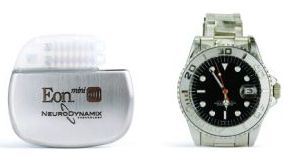St Jude mini neurostimulator to treat chronic migraine gains EU approval
21 September 2012
St. Jude Medical's Eon family of neurostimulators for patients with intractable chronic migraine has received approval for marketing in the EU.
Preceding the Eon family approvals, the company received European CE Mark for its Genesis neurostimulation system, the industry’s first regulatory approval for an implanted neurostimulation device to treat patients with intractable chronic migraine.
The Eon and Genesis systems deliver peripheral nerve stimulation (PNS) of the occipital nerves to manage the pain and disability associated with intractable chronic migraine. This type of migraine is defined as headache lasting at least four hours per day for 15 or more days per month, causing at least moderate disability, and not responding to three or more preventive drugs.
PNS therapy for this condition involves the delivery of mild electrical pulses to the occipital nerves that are located just beneath the skin in the back of the head. A small electrical lead or leads are placed under the skin and connected to the neurostimulator, which produces the pulses of stimulation.
“Intractable chronic migraine is one of the most difficult-to-treat headache disorders,” said Professor Gennaro Bussone, M.D., head of the Neurological Department at Istituto Besta in Milan Italy. “By definition, people living with this condition are spending half their month living with debilitating headaches. This therapy expands our options in helping manage patients who suffer with disabling chronic migraine symptoms.”
“Neurostimulation technology represents an exciting new approach to treat intractable chronic migraine,” said Eric S. Fain, M.D., president of the St. Jude Medical Implantable Electronic Systems Division. “We are proud to be able to offer this potentially life-changing therapy for patients who suffer with this debilitating condition and so desperately need a more effective treatment option.”

About migraine
Migraine is a neurological disorder characterized by a number of specific symptoms that can last for hours or days at a time. The severity of each migraine attack can vary widely, with typical symptoms ranging from sensitivity to light, noise and motion to nausea and vomiting in addition to headache. In general, chronic migraine sufferers have progressed to the level where they have migraine or migraine-like symptoms on more days than they are migraine free.
Estimates by the World Health Organization (WHO) indicate that 10%of adults worldwide suffer from migraine and 1.7 to 4% of adults have headaches 15 or more days per month. In fact, migraine ranks as one of the top 20 most disabling conditions in the world, according to WHO.
In terms of monetary cost, it has been estimated that migraine headache is one of the most expensive neurological disorders. According to the European Journal of Neurology the total annual cost attributed to migraine amounts to €111 billion in the EU.
Source: St Jude Medical